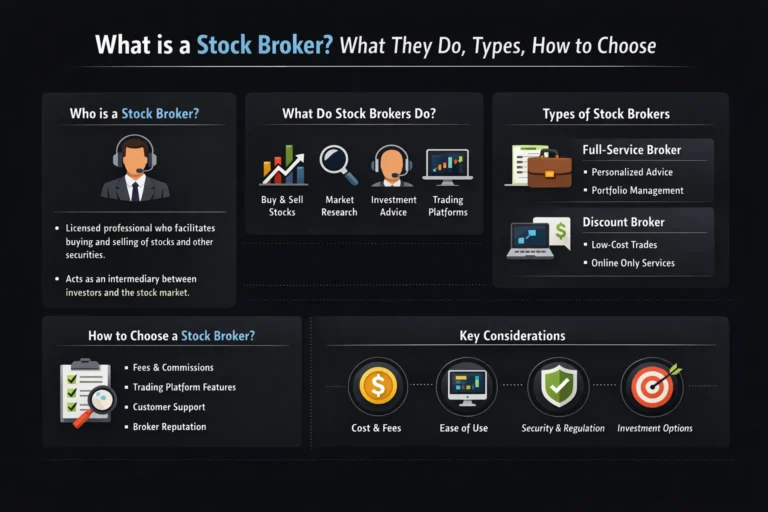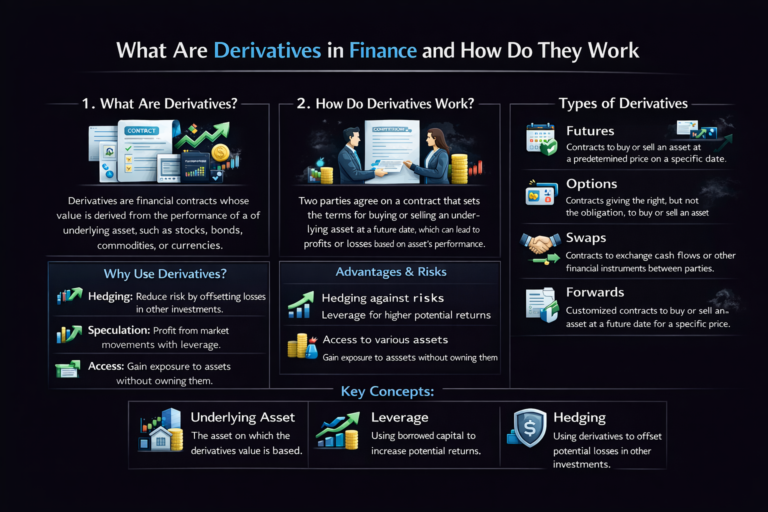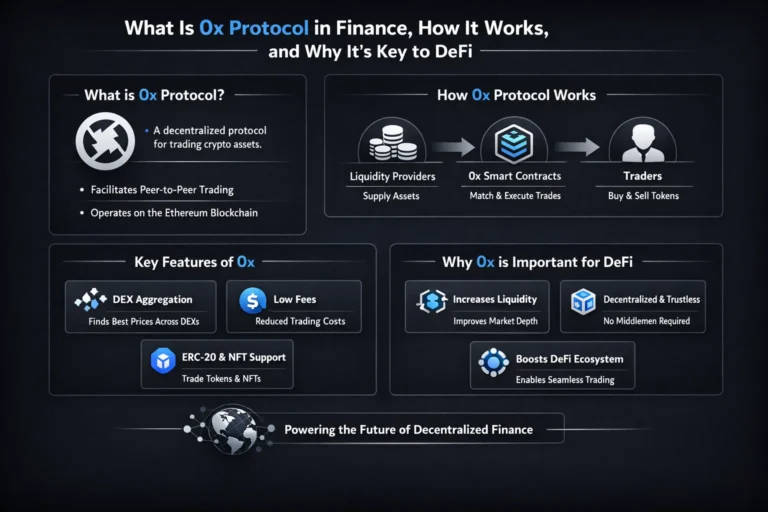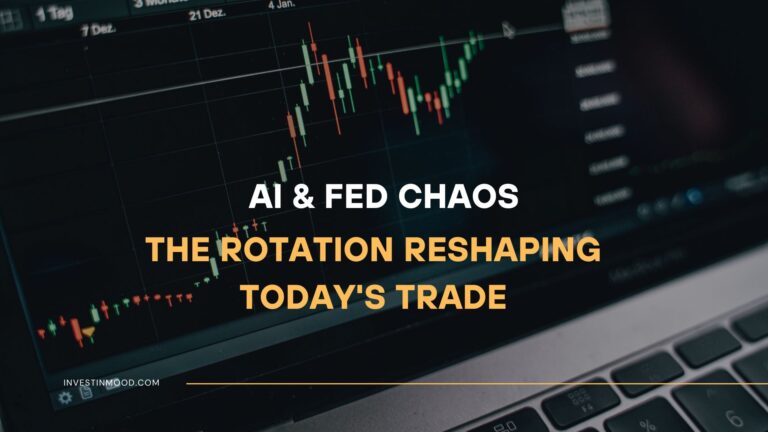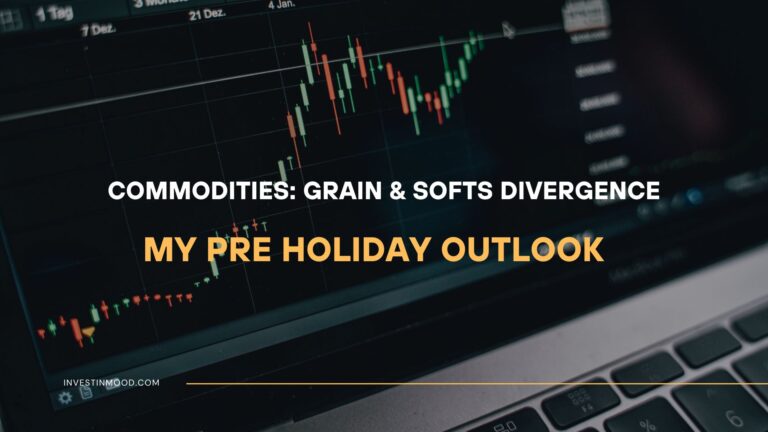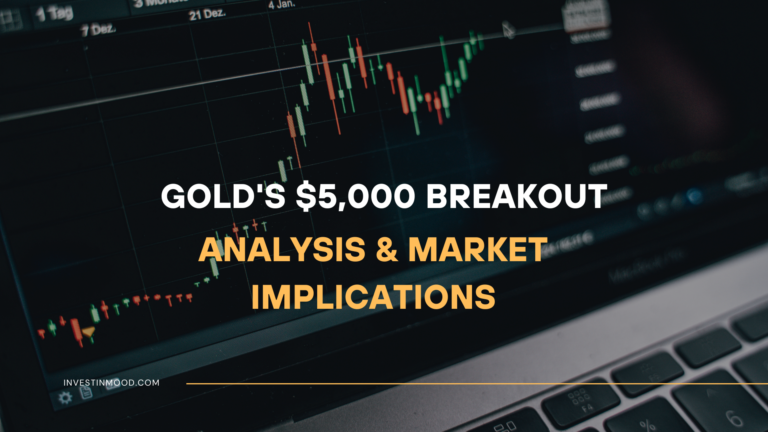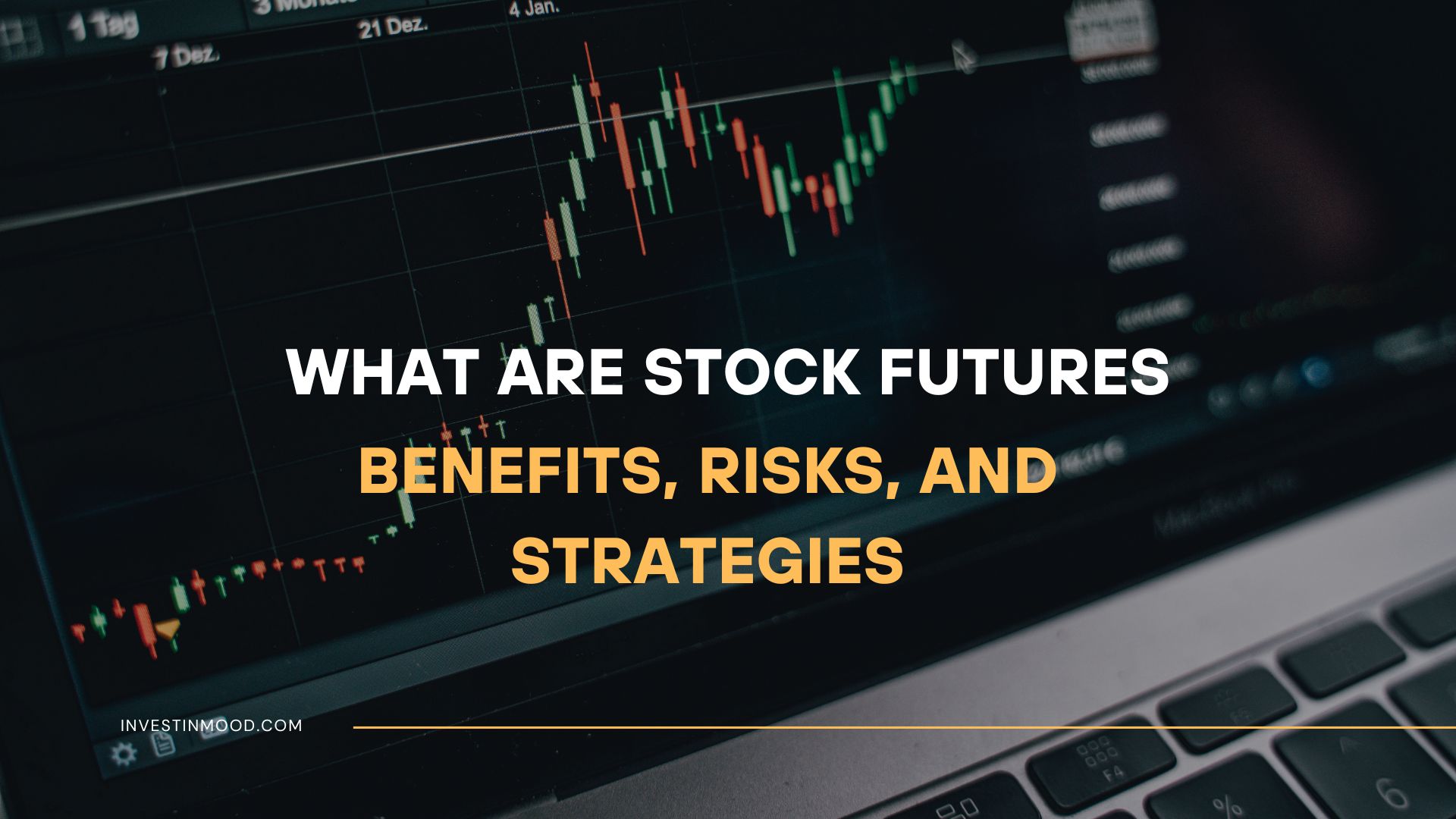
What Are Stock Futures Benefits, Risks, and Strategies
A stock futures contract is a binding agreement to buy or sell a specific stock at a predetermined price on a future date. It’s a cornerstone of the derivatives market, allowing traders and investors to hedge risk, speculate on price movements, and gain leverage without owning the underlying asset. For active market participants in the US, UK, Canada, and Australia, understanding stock futures is essential for navigating exchanges like the CME, Eurex, and the ASX.
Summary Table
| Aspect | Detail |
|---|---|
| Definition | A legally binding agreement to buy or sell a specific quantity of a stock at a predetermined price on a specified future date. |
| Also Known As | Equity Futures, Single-Stock Futures |
| Main Used In | Derivatives Trading, Hedging, Speculation, Portfolio Management |
| Key Takeaway | They provide leverage and allow for hedging and speculation, but this leverage also amplifies potential losses, making risk management paramount. |
| Formula | Futures Price ≈ Spot Price + Cost of Carry |
| Related Concepts |
What Are Stock Futures
A stock future is a standardized legal contract traded on an exchange, such as the CME Group in the US or Eurex in Europe. When you buy a futures contract, you are agreeing to purchase a set amount of shares (e.g., 100 shares of Apple) at a specific price on a future settlement date. Conversely, when you sell a futures contract, you are agreeing to sell those shares at that predetermined price. The key is that no shares are exchanged when the trade is initiated; it’s purely a promise for a future transaction. This makes futures a type of derivative because its value is derived from the underlying stock.
Think of it like locking in a price for a new car delivery in six months. If the car’s market price rises by then, you got a good deal. If it falls, you’re overpaying. Stock futures work the same way, but for shares.
Key Takeaways
The Core Concept Explained
The primary purpose of a futures contract is to transfer price risk. The long party (the buyer) is betting that the spot price (the market price of the stock) on the expiration date will be higher than the futures price they locked in. The short party (the seller) is betting the spot price will be lower. The difference between the final settlement price and the initial futures price determines the profit or loss.
A crucial feature is leverage. Instead of paying the full value of the shares upfront, you only deposit an initial margin, a performance bond set by the exchange. This allows for significant capital efficiency but also means that small price movements against your position can lead to margin calls, requiring you to add more funds to your account.
How to Calculate Stock Futures Price
While stock futures prices are discovered through market trading on exchanges, a theoretical fair value can be calculated. The core concept is that the futures price should equal the cost of buying the stock today and holding it until the futures expiration.
The Futures Pricing Formula
The most common model for equity futures pricing is the Cost of Carry model:
Futures Price = Spot Price + Cost of Carry
Where the Cost of Carry is primarily the interest you would pay to borrow money to buy the stock, minus any dividends you would receive from holding the stock during that period.
A more precise formula is:
Futures Price = Spot Price × (1 + r – d)^t
- Spot Price: The current market price of the stock.
- r: The annual risk-free interest rate (e.g., using US Treasury bills).
- d: The annual dividend yield of the stock.
- t: The time to expiration of the futures contract (in years).
Step-by-Step Calculation Guide
Let’s calculate the fair value of a 3-month (0.25 years) futures contract for a stock listed on the London Stock Exchange (LSE).
- Input Values:
- Spot Price (S): £100.00
- Risk-Free Rate (r): 2% (0.02)
- Dividend Yield (d): 1% (0.01)
- Time to Expiration (t): 3 months (0.25 years)
- Calculation:
Futures Price = £100 × (1 + 0.02 – 0.01)^0.25
Futures Price = £100 × (1.01)^0.25
Futures Price = £100 × 1.00249
Futures Price ≈ £100.25 - Interpretation: A fair price for the 3-month futures contract would be approximately £100.25. If the market price is significantly higher, it might be overvalued; if lower, it might be undervalued. This theoretical price acts as a anchor, with actual market prices fluctuating based on supply and demand.
Why Stock Futures Matter to Traders and Investors
Stock futures are a vital tool in modern finance, serving different purposes for different market participants.
- For Traders: Futures provide a high-leverage, cost-effective way to speculate on stock price movements. They can go long (bet on price increases) or short (bet on price decreases) with equal ease, and the deep liquidity allows for entering and exiting positions quickly. The 24-hour trading on many futures markets also allows for reacting to global news events.
- For Investors: The primary use is hedging. An investor holding a large portfolio of Australian stocks, for instance, can short ASX index futures to protect against a broad market downturn. This strategy, known as a protective put-like hedge, helps to lock in portfolio values without selling the actual stocks, which could trigger tax events.
- For Institutions: Large funds and market makers use futures for efficient capital allocation, arbitrage opportunities (exploiting price differences between the futures and spot market), and managing systemic risk across their vast holdings.
How to Use Stock Futures in Your Strategy
Use Case 1: Hedging a Long-Term Portfolio
- Scenario: You hold $500,000 worth of tech stocks listed on the NASDAQ and are worried about a potential sector-wide correction over the next quarter, but don’t want to sell and incur capital gains taxes.
- Action: You decide to short (sell) a number of NASDAQ-100 E-mini futures contracts equivalent to your portfolio’s hedge value. If the market falls 10%, the loss in your stock portfolio is offset by the profit from your short futures position.
Use Case 2: Speculative Leveraged Trade
- Scenario: After thorough research, you believe a specific company listed on the Toronto Stock Exchange (TSX) is poised for a significant earnings beat.
- Action: Instead of buying $50,000 worth of shares, you buy a single-stock futures contract for a fraction of the cost as margin. If the stock rises 15%, your return on capital is magnified several times over compared to owning the stock outright. However, a 15% drop would be equally devastating.
Use Case 3: Cash-Flow Management
- Scenario: A fund manager knows they will receive a $1 million cash infusion in three months and wants to gain immediate exposure to the S&P/ASX 200 index to avoid missing a potential rally.
- Action: They can buy ASX 200 index futures today. This effectively locks in the market exposure. When the cash arrives, they can sell the futures and buy the underlying stocks, having participated in the market’s performance during the interim.
To start analyzing futures charts and building these strategies, you’ll need a powerful trading platform. We recommend exploring our review of the Best Online Brokers for Futures Trading to find one that suits your needs.
The Psychology of Trading Futures: Managing the Leverage Mindset
Trading futures isn’t just about strategy; it’s a psychological battle. The high leverage can trigger intense emotional responses—euphoria during wins and panic during losses.
- Fear of Missing Out (FOMO): Leverage can tempt you to enter trades without a solid plan because “this could be the big one.” Always stick to your predefined entry and exit criteria.
- The Revenge Trade: After a loss, the urge to immediately “win it back” with a larger, riskier position is powerful. This is a primary cause of account blow-ups. After a significant loss, step away from the screen.
- Discipline Over Greed: The ability to take profits at your target and cut losses at your stop-loss is magnified in importance with futures. Letting greed override your plan can turn a winning trade into a loser instantly.
Developing a robust trading plan that includes position sizing, risk-reward ratios, and strict discipline is not just a recommendation for futures trading; it is a necessity for survival.
- High Leverage: Amplify your trading capital to control larger positions.
- Hedging Efficiency: Effectively insure a portfolio against downturns at a relatively low cost.
- Liquidity: Major futures are highly liquid, allowing for easy entry and exit.
- Ability to Short-Sell Easily: It’s as easy to go short as it is to go long.
- Cost Efficiency: Lower transaction costs compared to trading the equivalent value of stocks.
- Leverage Risk: Can lead to losses that exceed your initial margin deposit.
- Complexity: Understanding margin and contract specs has a steep learning curve.
- Absolute Obligation: The contract must be fulfilled; there is no “walking away”.
- Time Decay: Contracts have an expiration date, adding timing pressure.
- Basis Risk: The hedge may not be perfect if futures and spot prices don’t move in unison.
A Checklist Before You Place Your First Futures Trade
Don’t jump in blindly. Use this checklist to ensure you’re prepared.
- Understand the Contract Specs: Do you know the ticker symbol, contract size (e.g., 100 shares), tick value (minimum price movement), and expiration cycle?
- Calculate Your Maximum Risk: Based on your stop-loss level and the contract size, what is the maximum dollar amount you could lose on this single trade?
- Check Your Margin Requirement: Does your account have enough capital to cover the initial margin plus a buffer for potential margin calls?
- Have a Clear Exit Strategy: What is your profit target? Where is your hard stop-loss? Write them down before entering.
- Know the Economic Calendar: Are there earnings reports, Fed announcements, or other high-impact events scheduled during your trade’s lifespan?
Stock Futures in the Real World: The Archegos Capital Meltdown
A stark, real-world example of the power and peril of using equity derivatives like swaps (which are economically similar to futures) is the collapse of Archegos Capital Management in 2021.
Archegos, a family office, built massive concentrated positions in a handful of stocks like ViacomCBS (US), Discovery (US), and GSX Techedu (China). They did this primarily through Total Return Swaps, a type of derivative where the bank owns the shares, but Archegos enjoyed the economic gains (or losses) in exchange for posting collateral (margin).
This provided immense leverage, allowing Archegos to control tens of billions of dollars in stock positions with a fraction of the capital. When the prices of these stocks began to fall in March 2021, Archegos faced massive margin calls from its prime brokers (like Credit Suisse and Nomura). Unable to meet these calls, the banks were forced to liquidate the underlying shares in a fire sale. This massive, simultaneous selling caused stock prices to plummet, vaporizing Archegos and resulting in over $10 billion in losses for the banks.
This event perfectly illustrates the systemic risks of leverage in derivatives. While not pure “futures,” the mechanics of margin calls and forced liquidation are identical and highlight why understanding these concepts is critical for any serious market participant.
Stock Futures vs Stock Options
A common point of confusion is the difference between futures and options. Both are derivatives, but their core mechanics are fundamentally different.
| Feature | Stock Futures | Stock Options |
|---|---|---|
| Obligation vs. Right | Obligation to buy/sell | Right, but not obligation, to buy/sell |
| Upfront Cost | Initial Margin (a deposit) | Premium (a non-refundable cost) |
| Potential Loss | Unlimited | Limited to the premium paid (for buyers) |
| Time Decay | Expires to a specific price | The option’s value erodes as expiration nears |
| Primary Use | Speculation, Hedging | Hedging, Income Generation, Speculation |
Conclusion
Ultimately, stock futures are a sophisticated and powerful financial instrument that serves a dual purpose: risk management for the cautious and leveraged speculation for the bold. As we’ve explored, their advantages in terms of leverage, cost, and hedging efficiency are significant. However, these benefits are counterbalanced by substantial risks, including the potential for rapid, magnified losses and the complexity of managing margin requirements. They are not a tool for the uninformed. By incorporating stock futures thoughtfully into a broader, well-researched strategy—and always prioritizing risk management—you can harness their power to achieve specific financial goals, from protecting your portfolio to capitalizing on market movements.
Ready to put these concepts into action? The right brokerage platform is essential. We’ve meticulously reviewed and ranked the best online brokers for active traders to help you find one with the tools, education, and low margins needed for futures trading.
Related Terms
- Options Trading: Gives the holder the right, but not the obligation, to buy or sell an asset. A core alternative to futures.
- CFDs (Contracts for Difference): Another leveraged derivative product popular in Europe and Australia, but often traded over-the-counter (OTC) rather than on a centralized exchange.
- Margin Trading: The practice of borrowing money from a broker to trade assets, which is the foundational concept that enables leverage in futures.
- Index Futures: Futures contracts based on a stock index (like the S&P 500 or FTSE 100) rather than a single stock. They are one of the most common types of futures used for hedging and speculation.
